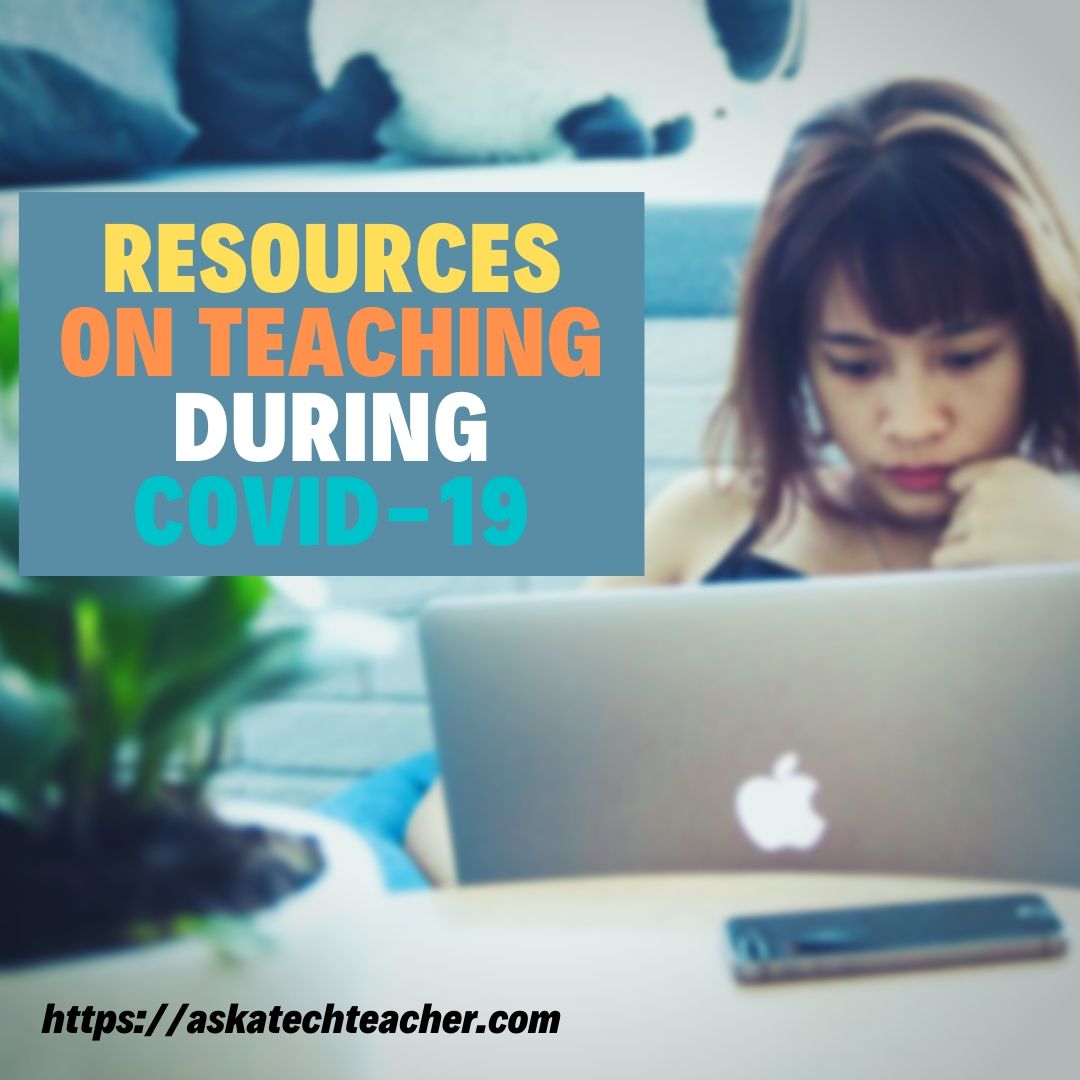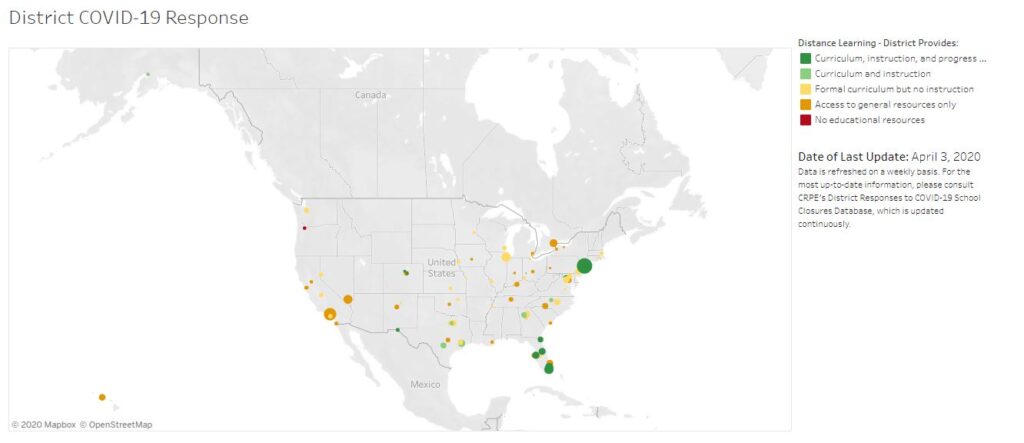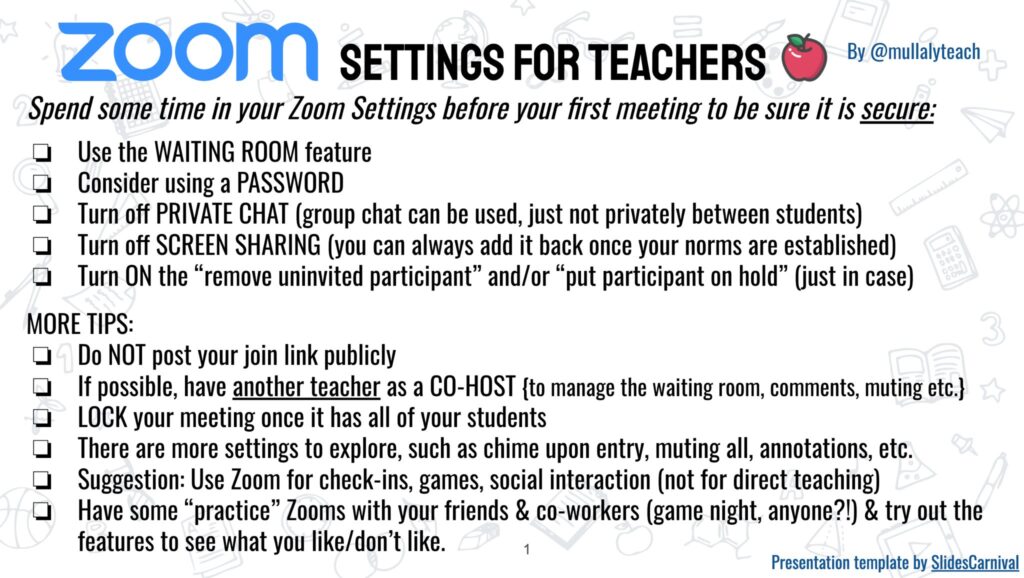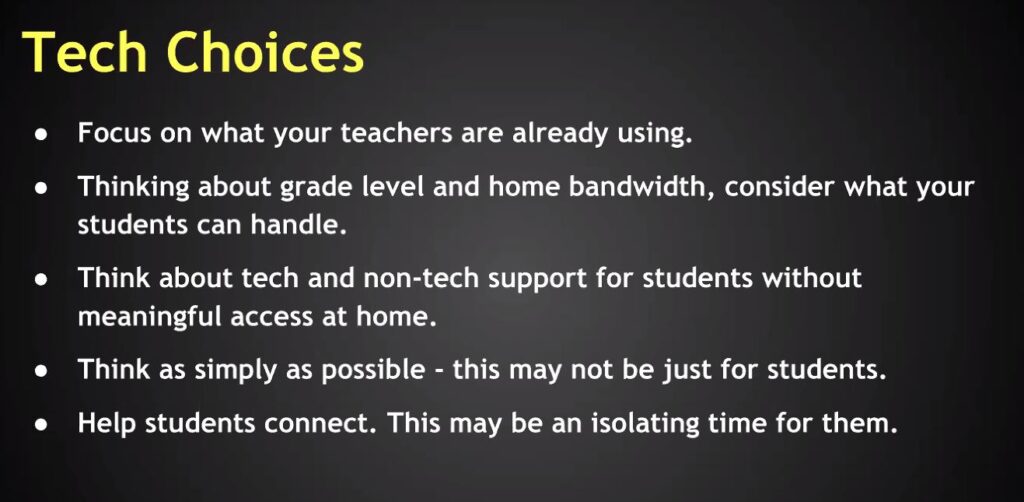Author: Jacqui
Teaching During #CoronaVirus–An Old Strategy That’s Perfect
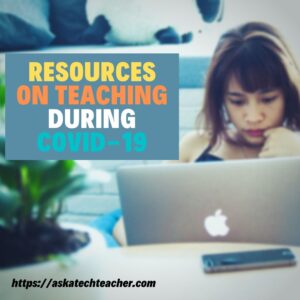 A problem with online teaching is that students have to sit through a long lecture-sort of presentation–if you’re trying to replicate your classroom teaching. Some good advice I see over and over regarding teaching online is DON’T try to replicate your physical classroom. Instead, teach using online’s strengths. A good way to do that is with a flipped classroom. Chris Landry, an eighth-grade science teacher at Memorial Middle School, said he’s been able to continue teaching students amid the closures through videos and has even provided them with fun activities to do at home. What made it easier? Flipped Classrooms:
A problem with online teaching is that students have to sit through a long lecture-sort of presentation–if you’re trying to replicate your classroom teaching. Some good advice I see over and over regarding teaching online is DON’T try to replicate your physical classroom. Instead, teach using online’s strengths. A good way to do that is with a flipped classroom. Chris Landry, an eighth-grade science teacher at Memorial Middle School, said he’s been able to continue teaching students amid the closures through videos and has even provided them with fun activities to do at home. What made it easier? Flipped Classrooms:
“…adjusting to the new way of teaching was easier than expected because he was using a “flipped classroom” while schools were in session.
For a thorough overview of flipped classrooms, take a look at this infographic from Cool Infographics:
Share this:
Stem Education in 2020
A growing focus of schools is STEM. Ask a Tech Teacher contributor, Brianna, has some general observations about STEM education in 2020:
Stem Education in 2020
About two decades ago, the sciences were not so popular among younger generations. People keen on mathematics, physics, or IT were awe-inspiring and seemed to have supernatural abilities. But, the importance of sciences and technologies has grown; that’s why professionals in certain fields have become headhunters’ “targets.” The world’s workforce lacked a lot of science specialists, that is why STEM education became more popular.
So, what is STEM education? STEM is an acronym that stands for science, technology, engineering, and mathematics. These subjects are being taught cross-disciplinary and in a complex which refers to real situations. This approach fosters the motivation of students which tend to make use of essay help service and tutors to have work done. You might think that there can be nothing new about STEM education in K-12 and higher education. Still, there are several facts you may want to know about.
The Role of Technology
The essential component in 2020 is a T-part of STEM – Technology. It is not only an object of education but a necessary and irreplaceable means of teaching STEM as well. For several years now, we observe a rapid growth of online and remote teaching, learning, and even practicing. Education in various disciplines has undergone significant change with the introduction of VR and AR into the classrooms. Now it is possible to create virtual reality and virtual laboratories for students to practice in. And this is only a small part of the technologies’ influence on modern life and education.
Grants and New Opportunities
Currently, numerous STEM courses and grants are launching in many universities and organizations. Moreover, famous corporations and brands are funding them, making it possible for students with limited financial possibilities to get quality education free of charge. Such examples are Ford Motor, Toyota Foundation, and Toshiba. They offer grants not only to students of higher education institutions but at a school level too. The NEA Foundation also promotes grants and projects to underserved communities that do not have access to a quality education process and resources.
Share this:
What You Might Have Missed in March
Here are the most-read posts for the month of March:
- Tips to avoid plagiarism
- College classes in blended learning
- New book from Ask a Tech Teacher: Inquiry and PBL
- How to Eteach in a COVID-19 Pandemic
- 2020 Edtech trends
- Why teach poetry?
Share this:
#CoronaVirus–This Week’s Inbox
 Most of us are only a few weeks into teaching remotely. It’s still chaotic, messy, but we’re trying to make it work. We have the will, just need the way.
Most of us are only a few weeks into teaching remotely. It’s still chaotic, messy, but we’re trying to make it work. We have the will, just need the way.
Lots of education companies are stepping up to make that possible. Here’s a sampling of the many and varied emails I got this past week offering help:
More Resources to teach remotely
- Babbel–free language learning for all US K12 and college students
- Book Creator–if you use Book Creator, they have help for you as you teach remotely
- Flinn At-home Science
- Free resources for educators during the coronavirus pandemic–from SmartBrief on EdTech
- Houghton Mifflin Harcourt online At-home Learning Resources
- PBS–free curated standards-aligned videos, interactives, lesson plans, and more for CA
- STEM Remote Learning Solutions from Vernier–free for a limited time
- Thoughtful Learning Writing Units–free during Pandemic
- Wide Open School–from Common Sense Media
Remote Learning Tips
- Home Network Tips for WiFi use from the FCC
- Here’s what schools can do for students without internet–from EdSurge
- Tactical Ideas for Virtually Coaching Your Newly-virtual Teachers–a 35-minute video from Adam Geller
- Working from Home Tips for Teachers–from Edublog
More about COVID-19
This next shows how US school districts are managing remote teaching. Map of responses to COVID 19 from schools—pretty scary, at least to me. This updates constantly so what you see below may not be the most current. Click through:
Share this:
Why College Matters for a Successful Career in Tech
There is a lot of conversation about college vs. career–the pros and cons of each weighed against the needs of individual students. Here’s a thoughtful article from Peter MacCallister, an Ask a Tech Teacher contributor, on why college is a good idea even when considering a career in tech:
 Why College Matters for a Successful Career in Tech
Why College Matters for a Successful Career in Tech
Technology is one of the areas where self-education, or autodidacticism, can bring outstanding results and allow an individual to achieve professional success without holding official certifications to prove his knowledge and skills. Self-taught people study better without guidance and prefer to have full control over what, when and how they study. Why would such a person interested in a tech career spend thousands of dollars to go to college instead of learning at home? The reasons are plenty so let’s delve deeper into this issue.
A Prestigious College is a Playground for Networking
Getting into a highly-ranked college or university can give your career an incredible impetus if only for the fact that you’ll be surrounded by intelligent and accomplished people with similar interests. Colleges offer countless possibilities for networking both with professors who are experts in your field and with fellow students.
Imagine having attended classes with Elon Musk or Warren Buffet as a fellow student at an elite institution like the University of Pennsylvania. Good colleges and universities are filled with incredibly driven and passionate students from whom you can learn a lot and with whom you might collaborate professionally one day. Having many bright minds in one spot increases your chances of meeting future visionaries in your field.
Colleges Have an Extensive Network of Resources
At first glance, it seems that programmers, software developers and other tech professionals need little more than a computer with an Internet connection to develop their skills. However, no matter how motivated and passionate you are, there is a cap to self-education. A point comes when you need serious output from the external world to continue to grow at the same rate.
Libraries, laboratories, expensive software licenses, access to reputable academic journals and career assistance – all these represent only a part of the wide range of resources that a good university provides to students so they can excel in their field. Hunching over your computer for weeks and months to find a solution to a problem that your peers have solved long ago is counterintuitive. Meanwhile, having access to valuable resources allows you to keep in touch with the latest developments in the sector and make sure you stay on track.
Share this:
Teaching Online During COVID-19–More from my Inbox
 I am so proud of how the education community has stepped up to the challenge teachers face to continue the learning despite apocalyptic changes in the delivery system. Definitely this means teachers, administrators, parents and students, but I also include the companies and resource providers in the education ecosystem.
I am so proud of how the education community has stepped up to the challenge teachers face to continue the learning despite apocalyptic changes in the delivery system. Definitely this means teachers, administrators, parents and students, but I also include the companies and resource providers in the education ecosystem.
Here’s a sampling of the many and varied emails I got this past week offering help:
- New Remote Learning Tools and Resources
- How to teach remotely
New Remote Learning Tools and Resources
- America’s Pledge of Allegiance–this video teaches kids how to do it and this video makes it more of an event
- Canva for Education–Free (oh boy, I love this website)
- Checklist for Remote Learning
- Microsoft Distance Learning Tools from the amazing Dr. Monica Burns
- Two Collections of Hands-on Science Experiments to do at Home–From Richard Byrne
- Using buses as mobile hotspots--park the bus by a park for 30-60 minutes so students can download what they need for the day.
- Zapzapmath–automatic upgrade to premium until the end of the school year
Zoom is also offering a free upgrade to educators to help them to teach remotely during the pandemic. Here are a few tips on using Zoom to teach remotely:
Share this:
Teaching Online During COVID-19
 Teaching during the COVID-19 pandemic is challenging. We educators understand online learning, probably have taken classes this way, but we haven’t yet wrapped our brains around how to make it work in OUR classes. In fact, the biggest question I get from teachers in my online classes and on my blog is:
Teaching during the COVID-19 pandemic is challenging. We educators understand online learning, probably have taken classes this way, but we haven’t yet wrapped our brains around how to make it work in OUR classes. In fact, the biggest question I get from teachers in my online classes and on my blog is:
“How do I do it?”
I know–very broad–but teachers are worried. They are invested in teaching their classes and suddenly it seems impossible to meet yearly goals, build lifelong learners. What can they do to make that happen? To fulfill their personal goals of getting students excited about learning?
Here’s what I’ve heard this past week or so:
- Issues
- Pedagogies for distance learning
- Curricula for online teaching
- Links fellow teachers are using that work
These aren’t comprehensive, just what I’ve heard as most of us are only one-two weeks into this challenging education opportunity.
Issues
“The classroom teacher can’t be replaced by an electronic device.”
That’s not what happens in online teaching. The teacher is as critical or more in an online classroom as they are in the physical class. The old style of online class that was impersonally delivered has been replaced by an active teacher fully involved in the online experience. She is simply in the cloud rather than in the room.
How to I provide equity for those without computers or internet access at home is challenging?
Share this:
Here’s a Preview of April
 Here’s a preview of what’s coming up on Ask a Tech Teacher in August:
Here’s a preview of what’s coming up on Ask a Tech Teacher in August:
- Teaching Online During COVID-19
- World Backup Day
- 8 Websites to Teach Financial Literacy
- 7 Tips for Netiquette
- 18 Easter Websites
- How to Build Your Own Tech Curriculum
- How to Assess Digital Literacy
- Activities for Earth Day
- Online class in Differentiated Instruction
- Earth Day
- Tech Tools for Specials
- 13 Pedagogies that will make you a Better Teacher
- 3 Apps That Energize Learning
- Find Public Domain Images
Share this:
Britannica LaunchPacks free of charge to US Schools
T here are lots of companies stepping up to help the need to move learning online. The latest is Britannica:
here are lots of companies stepping up to help the need to move learning online. The latest is Britannica:
Britannica’s LaunchPacks® offered free of charge to all US schools
As schools across the United States close or prepare to close to prevent the spread of COVID-19, Encyclopaedia Britannica is offering all schools’ and students free access to its popular LaunchPacks® Science and Social Studies learning content.
LaunchPacks offers K-12 students a full range of articles, images, videos and primary sources of information to engage children in ‘factually correct’ learning content. Presented through an online engaging interface, optimized for smart devices, Britannica is offering free access to both LaunchPacks Social Studies and LaunchPacks Science.
Each content pack includes a variety of multimedia resources to match the PreK-12 science and social studies curriculums, to promote critical inquiry, and build connections between disciplines.
LaunchPacks offers the highest quality learning content, assessments, reading support tools, and translations that enable non-native English-speaking parents to engage with at-home learning. The wealth of learning content makes it ideal for virtual teaching and learning, to minimize disruption and impact on students, families, and staff.
To access the platform, schools can register at http://britannicalearn.com/covid-19-free-resources and refer to the ‘how to use’ guide for remote learning at LaunchPacks. A team member will promptly help users set up free access to LaunchPacks and share remote learning information and resources.
“Our team at Britannica is made up of dedicated teachers, educators, and parents,” said Rhea Vitalis, global director of marketing and social media with Britannica Digital Learning. “Your school and the wellbeing of your staff and students are our top priorities. Please don’t hesitate to reach out if there are additional ways we can ease your burden. We are here to offer continued support, relief, and guidance through these uncertain times.”
Share this:
Resources You Need During COVID-19
 My inbox–probably yours, too–is flooded with suggestions, how-tos, and don’t-do’s, on teaching online as a strategy for dealing with Covid-19. Though I’m not happy about the reason, I’m thrilled at the interest in online classes. I’m an adjunct professor – online only–for a variety of major universities (CSU for one). I’ve taught many years in both environments and love online teaching because it is flexible, diversified, self-directed, and self-paced. I agree with many studies—that online is more effective (one from IBM).
My inbox–probably yours, too–is flooded with suggestions, how-tos, and don’t-do’s, on teaching online as a strategy for dealing with Covid-19. Though I’m not happy about the reason, I’m thrilled at the interest in online classes. I’m an adjunct professor – online only–for a variety of major universities (CSU for one). I’ve taught many years in both environments and love online teaching because it is flexible, diversified, self-directed, and self-paced. I agree with many studies—that online is more effective (one from IBM).
As I received the onslaught of teach-online resources, I collected those that made the most sense. Below is a short curation of the most useful articles, links, resources, and webinars to help you through this challenging environment:
Online articles:
- Resources, tips and more for remote and e-learning (teaching online) — from Educational Technology Guy
- Tools to prepare for school closures–suggested by Common Sense
- Advice for new Online Teachers–from EdSurge
- Navigating Uncertain Times: How Schools Can Cope With Corona virus–from EdSurge
- Understanding the Impact of Coronavirus on K-12 Education–from EdSurge
- Newsela COVID-19 resource center (and free access to their paid products this school year)
- A live-tracker of the spread of the disease from Johns Hopkins University.
- Snow Day? 7 Ways to Keep Teaching
- An Open Letter to Teachers About Online Classes
- Remote Learning: Tips for Thriving in This Ecosystem
- Alice Keeler’s Tips and Resources for Managing and Maximizing Remote Learning
Online webinars:
One of the best I’ve watched in the last few weeks (as I dig into this subject) is Rushton Hurley’s (here’s the link). Here are some great suggestions for teachers who have to start fast with little preparation:
Here are three webinars from the knowledgeable Richard Byrne: Three Free Webinars About Transitioning to Teaching Online
Distance Learning Strategies for Education Leaders, Part 1
Date: March 17th, 2020
Distance Learning Strategies for Education Leaders, Part 2
Date: March 20th, 2020
A short curated list of resources for teaching online:
How-to
-
- Distance Learning with Google Slides–from Alice Keeler
- Resources for Teaching Online–from Edublog
Online chats
-
- Adobe Connect–fully-featured with lots of options for meeting students online
- Google Hangouts–max. of 10-15 people
- Nepris–bring experts into your classes
- Skype
- Unhangouts–gather in the virtual lobby and then join a GHO
Online course sites
-
- Blackboard
- Canvas
- CourseSites–like Blackboard, but free for some set-up
- Iteach.world–online class platform
Virtual Classrooms/Meetings
-
- Canvas–and it’s Big Blue Button conference option
- Draw Chat–virtual meeting with a whiteboard
- Google Hangouts
- Webroom.net — virtual conference or meeting room
- Zoom
Big Questions
If you’re still with me, here are quick notes on questions I’ve gotten from fellow educators over the past week or so:
What can you as a parent do in advance?
- Be positive, upbeat about these changes. They are good—you will grow to like them. Know the pros and cons—they are balanced, maybe even skewed in favor of online.
- Assume the teacher will be flexible with students as they adapt to online learning.
- Don’t give up—try, try again, and come up with a solution that works even if it isn’t perfect.
- Let your child try to solve their problems but be there to help if they get stuck. Most online classes aren’t a virtual meeting. They’re a list of assignments, discussion boards, forums, and projects that are accomplished at the students own pace. While you’re at work, you can help your child with your own virtual meeting (via free programs like Google Hangouts, Zoom, and Webroom.net) by screen-sharing their assignment page. You can even remote in without nearly as much trouble as that used to be. Your child is not in the same room as the teacher. Don’t think you must be in the same room as your child to help.
- Know how to get in touch with the teacher (since you can’t walk in and visit their classroom). FB? Messaging? Email? What’s the best way?
What are the biggest problems I face moving my teaching online?
- Tech knowledge–don’t give up; there are only so many problems. Once they’re solved, most of the rest of the experience will go smoothly.
- Problems—solve these together, you and the parents. Don’t try to be perfect, just a problem-solver.
Many students don’t have a home computer or access to the internet. What do I do?
These are difficult issues and have caused many schools to resist online teaching. To meet the suddenness of the Corona-19 pandemic, some schools are lending out their extra Chromebooks and purchasing more with newly-available Federal and State funds. Many Districts are deploying mobile hotspots to help students with internet access. Where that isn’t practical, teachers send work to students as PDF files that can be viewed and annotated on a computer and then printed with student input (this is the choice made by some New Jersey schools with a high percentage of students without computers or internet connectivity).
What should students and families know before their first online session?
- Don’t be afraid.
- Get help if you’re stuck.
- Be a risk-taker—boldly go where few have gone before.
***
In the end, it comes down to flexibility. We as educators must be mindful of the students without access to technology and provide alternative-but-equal options that adapt lessons to their circumstances. The issue of equity is one of the most important as schools move to online teaching. NEA Today will cover this in upcoming issues as this evolves.
#coronavirus #remotelearning
–also published on NEA Today
Jacqui Murray has been teaching K-18 technology for 30 years. She is the editor/author of over a hundred tech ed resources including a K-12 technology curriculum, K-8 keyboard curriculum, K-8 Digital Citizenship curriculum. She is an adjunct professor in tech ed, Master Teacher, webmaster for four blogs, an Amazon Vine Voice, CSTA presentation reviewer, freelance journalist on tech ed topics, contributor to NEA Today, and author of the tech thrillers, To Hunt a Sub and Twenty-four Days. You can find her resources at Structured Learning.

